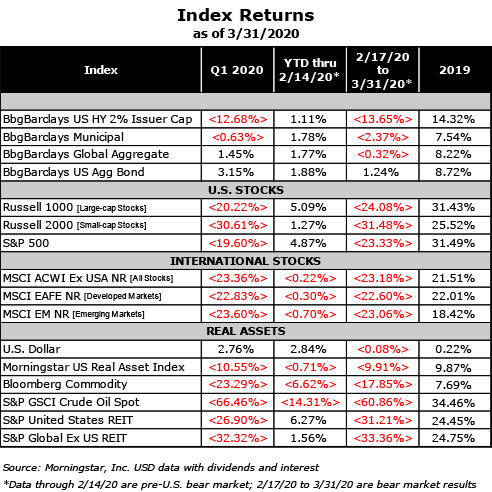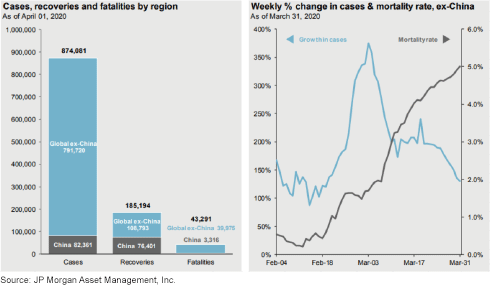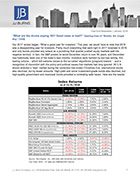“Nobody told me there’d be days like these / Strange days indeed” John Lennon, “Nobody Told Me”
One issue now dominates the concerns of every person with access to a news feed: the spread of the global coronavirus pandemic, COVID-19. The subject of various governmental crisis studies and science-fiction novels has become a reality, and much like the results of that previous science fact and fiction, the real pandemic has proven difficult to analyze and control.
Other back-burner economic issues that had been ignored as markets climbed higher all came sharply into focus when the stark reality of COVID-19 hit. The ramifications of a global lock-down on the trade wars, the oil-price dispute, excessive debt levels and slowing growth quickly amplified investors’ fears and caused a decline in equity prices. A flight to quality followed, and government debt and cash rotated as preferred asset havens as the crisis began to unfold. Investment-grade, high-yield and municipal bonds saw prices fall as investors sought safer assets due to concerns about liquidity and the ability of issuers to meet obligated payments. Companies reliant on discretionary consumer spending or any type of large assemblies of people quickly suffered. The U.S. Congress and central bank quickly stepped in to provide economic continuity through the crisis; foreign central banks and governments also stepped up quarantine and aid programs. These interventions are necessary and welcomed, and they will help assuage longer-term health fears and begin to provide economic stability to the beleaguered markets.

“Oh, deep in my heart / I do believe / We shall overcome, some day” Pete Seeger, “We Shall Overcome”
The arrival of COVID-19 has, sadly, provided answers to some of the questions that have been occupying us recently: When will we have a recession? When will stocks decline? Will interest rates go up or down? The virus and its attendant dislocations have also brought a new set of questions: When will it pass? Who will be affected? How bad will things get? What will ‘better’ look like? All that we truly know about the answers to these questions right now is, nobody knows. Let’s review some data related to the disease (which will change), and what we know and don’t know about coronavirus at this point:

- We do know where the virus started and how it’s spreading, and that there is currently no vaccine or effective antibiotic to manage symptoms.
- We also broadly know what has happened to various countries that have suffered outbreaks, how they managed them (e.g. lockdowns and/or enforced ‘social distancing’), and how long it took for various ‘levels’ of recovery.
- We also know that the U.S. looks like it will be the hardest hit country, at least for a time. We may be possibly supplanted by an Asian or African nation with higher population density and/or fewer resources to dedicate to treatment and administering a future cure.
- We don’t know how many people will ultimately be affected, when the infection will stop spreading, or how many virus ‘waves’ there might be.
- We do know that the brightest minds in virology and biomedicine are working on protocols to treat the virus and are making great strides in developing a vaccine.
- Finally, we don’t know what our lives will look like on the other side of this, but we do know that they’ll be different than they were just three months ago.
“You’ve got to accentuate the positive / Eliminate the negative” Bing Crosby, “Ac-cent-tchu-ate the Positive”
We can say that we know a bit more about the global economy and markets than we do about COVID-19.
- We know that we are in the first-ever forced global recession; it’s expected to be as tumultuous as the Global Financial Crisis 12 years ago. China’s impact will be amplified by their now much-larger economy and their severe lockdown to control the virus.
- There were positive aspects about the U.S. and (to a lesser extent) global economies before the crisis. We know that there will be a lengthy recovery from this recession, most likely ‘U shaped,’ that will see significant changes to companies, governments and economies on the other side.
- We also know that unemployment claims, at least on a short-term basis, will rise to historic levels and the equity markets have already priced this data point into the equation. We expect that Leisure and Hospitality Industry workers will be most affected.
- We know that governments and central banks quickly and appropriately offered trillions of dollars of direct and indirect support to the global economy and the markets (primarily for debt securities). Interest rates are again at a ‘zero-bound’ level.
- We know that equity and some debt markets have suffered corrections that are at bear-market levels of decline. Since we don’t know how long or how severe the recession will be, it is too early to say that markets have bottomed. That said, opportunities abound in this market as good quality companies with strong balance sheets have dropped just as much as companies that are going to face substantial headwinds going forward.
Financial markets have reacted violently to the growing pandemic over the last 4 weeks for several reasons. First, there is a tremendous amount of uncertainty about the toll to be exacted upon human life. This uncertainty causes the human brain to become fearful and our ingrained “fight or flight” response is triggered. Investors want to sell stocks to stop the “pain” they are experiencing. No less than four weeks ago these same investors were euphoric (perhaps too much so) about the economic prospects for 2020 and were snapping up equity shares and unwilling to sell.
Second, the future health of the economy is in question. Uncertainty abounds, and when that is the case, investors who do not have long-term time horizons choose to sell good companies at low prices. Short-term traders also enter the picture taking advantage of the volatility to make money on both the short and long side.
Finally, we know that capitalism should be a ‘creative destruction’ process. Some companies shouldn’t—and won’t—make it through this crisis. Every company and every investor will need to think more intently about the sources and uses of capital, the value of cash, and the quality of balance sheets. With this realization, the mantra of diversification that we preach becomes even more important in an investor’s portfolio.
“Keep on smilin’ through the rain / Laughin’ at the pain / Just flowin’ with the changes” Wet Willie, “Keep on Smilin’”
The most important thing that we don’t yet know is how this crisis will affect each of us and our friends and families. We should expect changes, both big and small, to the way we know life to be. Some will occur quickly. We’re now experiencing a health crisis and severe financial dislocations in a world with more powerful and prevalent technology than we had 12 years ago during the global financial crisis.
So, we ask ourselves, what should we do now and in the immediate future? First and most important, take care of ourselves, and endeavor to help others if we can. We should also ask ourselves, what changes do I need to make and am I comfortable making? Those answers will affect the way we live and how we invest.
On the investment front, we will all need to revisit our expectations and plans, just as we did a decade ago. We should expect to make changes, again some big, some small. Over the past four weeks we have been actively rebalancing our portfolios back to their target allocations. Equities have declined while bonds have maintained their relative value. This means portfolios may have a higher allocation to fixed income than required. We have been repositioning portfolios by selling fixed-income investments and redeploying those assets into stocks, which may now be a value due to market declines. We are following our “play book”: we do not ‘panic sell’ and raise cash if your goals remain the same. We rebalance portfolios by selling over-weighted assets to buy assets that are underweighted.
Finally, we believe there’s no time like the present to begin looking forward and being proactive. Opportunities abound for investors who can look beyond the short-term market turmoil and envision what life and our economy look like on the other side of this self-imposed economic shutdown. Panic selling and liquidating equities might make an investor feel good in the short-term, but it is the wrong course of action if they believe that 18 months from now the economy will resume its growth trajectory. Small business owners and corporations are resilient. Many have already begun to pivot to serve their customers in the new social and economic realities we are facing today. More will follow and our economy will recover. If you believe in capitalism and free markets, the best course of action is to assess your short-term needs, review your financial plan and make the adjustments necessary to weather the storm.
As always, please feel free to contact us with your comments and questions.
—Your Wealth Management Team at JJ Burns & Company
Download Market Commentary
Disclosure: J.J. Burns & Company, LLC is a registered investment adviser with the U.S. Securities & Exchange Commission and maintains notice filings with the States of New York, Florida Pennsylvania, New Jersey, Connecticut, Georgia, Illinois, North Carolina, and California. J.J. Burns & Company, LLC only transacts business in states where it is properly registered, or excluded or exempted from registration. Follow-up and individualized responses to persons that involves either the effecting or attempting to effect transactions in securities, or the rendering of personalized investment advice for compensation, as the case may be, will not be made absent compliance with state investment adviser and investment adviser representative registration requirements, or an applicable exemption or exclusion.
All investing involves risk, including the potential for loss of principal. There is no guarantee that any investment plan or strategy will be successful.
The foregoing content reflects the opinions of J.J. Burns & Company, LLC and is subject to change at any time without notice. Content provided herein is for informational purposes only and should not be used or construed as investment advice or a recommendation regarding the purchase or sale of any security. There is no guarantee that the statements, opinions or forecasts provided herein will prove to be correct.
Past performance may not be indicative of future results. Indices are not available for direct investment. Any investor who attempts to mimic the performance of an index would incur fees and expenses which would reduce returns.
Securities investing involves risk, including the potential for loss of principal. There is no assurance that any investment plan or strategy will be successful.


